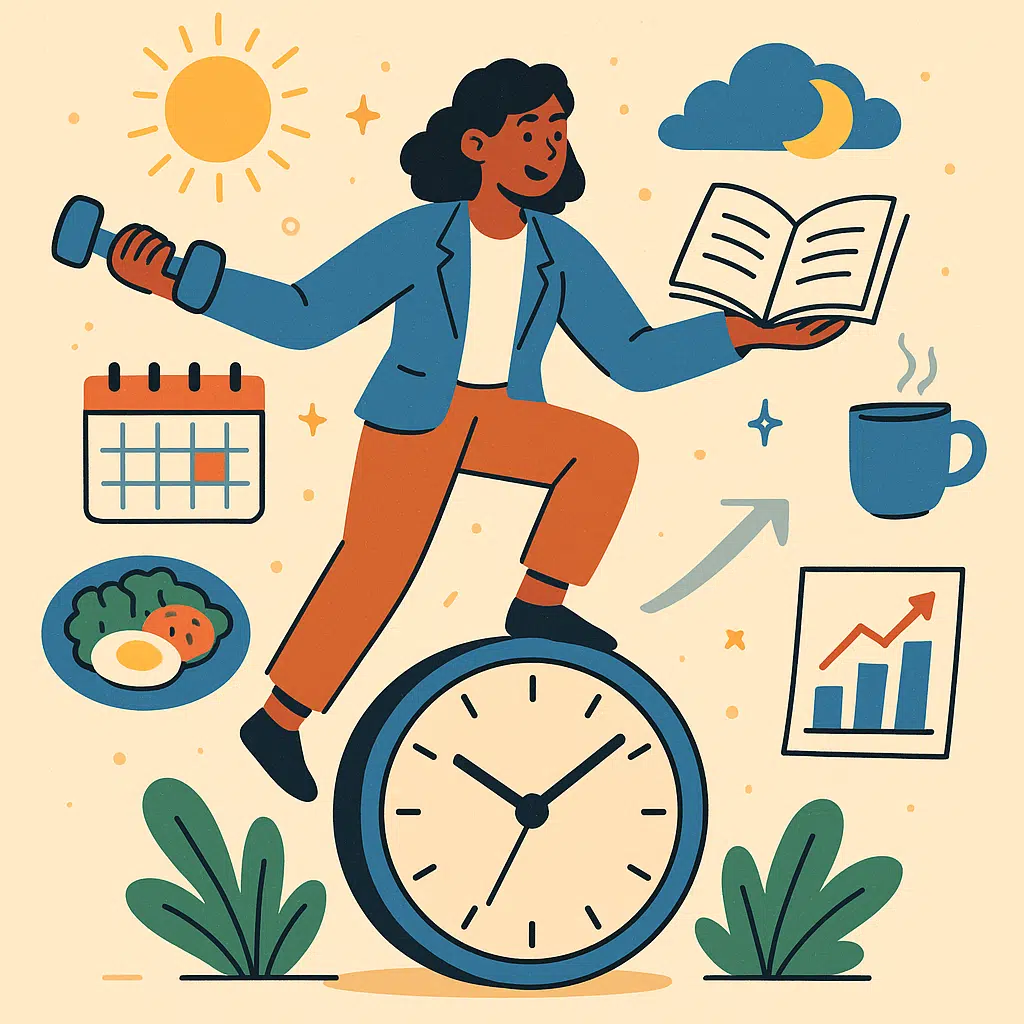How Building a Balanced Routine Supports Professional Achievement
Isabella Lewis August 11, 2025
You’re scrolling through your feed—not a pitchy life coach post, but a legit, well-researched breakdown. Here’s the truth: a balanced routine supports professional achievement in a big way. Especially now, as workplace culture shifts from “hustle until you drop” to “smart rhythm, real rest, fewer days, more flow.” Cue the four-day workweek buzz—it’s so 2025. Let’s unpack how building a balanced routine plugs right into that trend in a way that actually sticks.

Why the Four-Day Workweek Is a Hot Trend in 2025
The four-day workweek is surging in 2025, moving from experimental pilots to a mainstream shift in how businesses operate. According to TalentLMS and workplace analysts, millions could adopt this model by 2033, with AI enabling companies to prioritize outcomes over hours worked. Many organizations are already testing it, reporting sustained productivity and happier employees.
It’s not just about cutting hours—it’s about scalability. Workforce management experts note that compressed schedules streamline tasks and boost efficiency, focusing on high-impact work rather than time spent. This aligns with a broader shift toward results-driven cultures, where trust and flexibility drive success.
Employee demand is a key driver. Workers increasingly prioritize mental health, well-being, and work-life balance, viewing rigid five-day schedules as outdated. Studies show shorter workweeks reduce burnout, improve focus, and lower turnover, making them a powerful tool for talent retention.
The trend is reshaping workplace norms, sparking curiosity about what a “routine” could be. Early adopters, from startups to corporations, are seeing benefits like better recruitment and even potential environmental gains from less commuting. In 2025, the four-day workweek is redefining productivity and well-being, setting the stage for a new era of work.
What Does a “Balanced Routine” Mean in This Context?
Spoiler alert: It’s not about rigid schedules that chain you to a 5 a.m. to 9 p.m. grind. Nope. A balanced routine is structure with space—a framework that supports your goals while leaving room for life’s surprises. Here’s why that matters:
Routine reduces decision fatigue. Medium notes that routines streamline choices, saving mental energy for what counts. This boosts focus, cuts stress, and builds self-efficacy over time, making you feel more in control.
Structure equals less overwhelm. April A. Bader explains that consistent routines enhance productivity, improve time management, and reduce stress. A simple morning ritual, like coffee and a quick to-do list, can set a calm, focused tone for the day.
During stress, routine is therapy. Verywell Mind emphasizes that routines offer mental breathing room, especially in chaotic times. A nightly wind-down, like 10 minutes of reading, can signal relaxation and improve resilience.
Pairing a balanced routine with a four-day workweek is a game-changer. The routine keeps workdays focused, while the extra day off gives space for rest or personal growth. It’s a fire combo of rhythm and recovery that helps you thrive without burning out.
How a Balanced Routine Supports Professional Achievement in This New World
1. Compensates for compressed weeks
You’ve got one fewer day—so structure your four days and rest day to maximize output without burnout. Routine keeps the engine steady.
2. Boosts efficiency and delivery
Tight schedules plus deliberate habits mean you eliminate fluff. You’re optimizing your flow for peak performance.
3. Supports mental resilience
Switching to a shorter workweek isn’t magic—your brain still needs structure to stay sharp. Routines help anchor your identity and momentum.
4. Enhances well-being—and well-being drives output
Flexible schedules are great—but studies show it’s access and utilization that improve performance, mediated by well-being. A balanced routine helps ensure you’re actually using that access to care for yourself.
5. Improves job satisfaction and reduces burnout
Evidence shows that better work–family balance plus supportive routines strongly correlates with loyalty, motivation, and performance.
Building Your Own Balanced Routine (Simple, Practical Guide)
Ready to design a routine that fits the four‑day workweek—without losing your mind? Here you go:
1: Map your ideal week
- Block your four workdays (e.g., Mon–Thu), then give yourself the long weekend to truly recharge.
- For workdays, structure your day into:
- Morning ritual (hydration, movement, mental prep—e.g., journaling or affirmations). This sets the tone.
- Work sprints (focus on 3 big tasks, à la the “3‑3‑3 method”: 3 work tasks, 3 self‑development moves, 3 leisure chunks)—sweet spot from recent thinking.
- Wind‑down practice, e.g., chef‑inspired rituals like changing shoes, brief walks, or symbolic shifts that signal transition.
2: Keep routine flexible and feel-good
- Your morning doesn’t need to be 4 a.m.—30–90 minutes is ideal, depending on your rhythm.
- Adjust your routine based on energy levels—be kind to yourself on rough days.
3: Prioritize recovery and progress
- Use that extra day off to actually rest: sleep in, reflect, not just a second job.
- Schedule light activity, creative time, or learning/spiritual reflection.
4: Evaluate and tweak
- Flexibility is key. Check in monthly: is your routine sustainable, is it helping you perform and feel sane?
- Trends in HR culture show the best work–life balance isn’t static—it’s adaptive.
Example Balanced Routine (for Gen Z Hustlers Who’ve Had Enough of Burnout)
| Time of Day | Activity |
|---|---|
| Morning | Wake up, glass of water, 10-min stretch or prayer, goal sketch |
| Work Day | 3 Work tasks → short break → 3 Personal development moves |
| Afternoon | Lunch, power hour of focus, a quick reset (walk or prayer) |
| Evening | Shutdown ritual—song, walk, change shoes, unplug |
| Rest Day | Sleep, nature walk, journal, coffee with a friend, spiritual reset |
In a Nutshell
- A balanced routine supports professional achievement by providing consistency, reducing decision fatigue, anchoring your mental state, and maximizing flexibility.
- With the rise of four-day workweeks, this kind of routine is no longer optional but essential for sustainable performance and well-being.
- Build yours with structure, adaptability, rest, and personal meaning—and you’ll thrive both at your desk and beyond.
References
- Harvard Business Review. (2022). The Power of Routines in Achieving Professional Goals. Retrieved from https://hbr.org
- American Psychological Association. (2021). Why Work-Life Balance Is Essential for Career Success. Retrieved from https://www.apa.org/
- Forbes. (2023). How a Consistent Daily Routine Can Boost Your Career. Retrieved from https://www.forbes.com/







